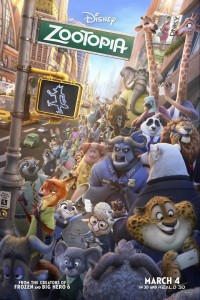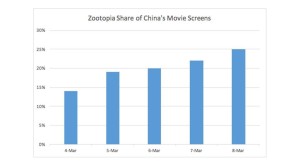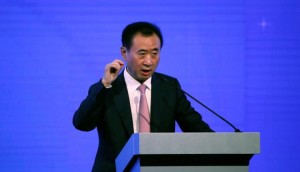“Have you seen Zootopia?” That’s one of the most frequent questions I was asked by my friends from home and abroad in March this year. With more than 1 billion box office globally including 0.2 billion from China’s market, Zootopia has successfully stampeded across the world including China. Moreover, Kung Fu Panda 3 which was supposed to be perfectly calibrated to Chinese tastes, keeps adding Hollywood grosses
In just the first 3 months of 2016, two Hollywood animated movies —Zootopia and Kung Fu Panda 3 by themselves combined to break 2014’s record of $286 million in box office grosses for American animated features in China. It won’t surprise that only animated movie exported to China from the United States will gross over $500 million in China’s market.
Other Hollywood hits in 2014 such as Dreamworks Animation’s How To Train Your Dragon 2 ($65 million in Chinese theatrical revenue), Universal/Illumination’s Despicable Me 2 ($53 million), Disney’s Frozen ($48 million) and Dreamworks/20th Century Fox ’s Penguins of Madagascar ($40 million) shows how blatant American culture export is and how lucrative China’s market is. Undoubtedly, Hollywood is the most competitive export to China compared to tons of made-in-China products imported to the States each year.
Some people argue that Hollywood is synonymous with America. To some extent, it might be true because American entertainment industry is highly visible in the world, that bear the sign of American culture pervasively. The movies made in Hollywood have shaped many Chinese youngsters’ fashion and attitudes for generations. The American films are entertaining, thrilling, and full of heroism. Now, even children from China can quote lines from American films.
Here is an ideal picture for Uncle Sam: America assembles movies and ships them to China, and China assembles merchandise promoting those movies and ships it back to America. Repeat.
However, don’t forget China has its sanction system. Films cannot play in China unless it is approved by the State Administration of Press, Publication, Radio, Film and Television. American studios with the hope of film distribution in China either submit to Beijing’s censors or become adept at self-censorship. China tightly controls U.S. investment in films in China. Although in 2012, China raised the number of foreign films that can be imported on a revenue-sharing basis to 34 from 20 per year to cater to the rules of WTO, the policy is set to expire and remain unknown yet.
Moreover, China’s footprint in Hollywood is growing. This year, Dalian Wanda Group, the Chinese real estate and entertainment giant, bought a controlling stake in Legendary Pictures, a major Hollywood studio that financed films like “Jurassic World.” Moreover, Wanda is now owning AMC theaters, the second-largest U.S. cinema chain.
(Picture of Wang Jianlin, at the announcement)
At the announcement, Wang Jianlin, the company’s chairman and China’s richest man, said the acquisition will allow greater distribution of Chinese films to international audiences. It marked a milestone that China is entering Hollywood, combating the long entertainment trade deficit and dominant market position of America.
According to Wang Jianlin, Chinese-made films does not generate enough interest in the American market. His move will promote Chinese movies to entertain American audiences.
China is ambitious to launch his next big export of creativity and culture. “Confucius Institute” has left its footprints globally. But entertainment export would hugely impact US-China cultural exchange.
Sanction system might not be a problem. If China has a strict sanction on American films to protect its domestic market. Why not America?
Nonetheless, Wanda’s move makes it seems hard to stop China’s steps into Hollywood.
Will the China’s entertainment trade deficit change ultimately? Who knows?



Leave a Reply
You must be logged in to post a comment.